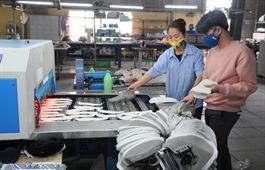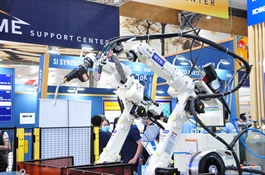Local retail market share battle heats up
Local retail market share battle heats up
The rapid expansion and domination of foreign brands in the Vietnamese retail market are acting as a driving force for domestic retailers to implement restructuring and expansion strategies to regain market share.

At the 2022 Emart Partners Day in Ho Chi Minh City last week, which was attended by more than 500 suppliers, THACO chairman Tran Ba Duong said the chain aims to have 20 stores across the country and revenues of $1 billion by 2026 to become the hypermarket chain with the largest market share in Vietnam.
THACO is one of the largest private groups in Vietnam in the automobile industry with nearly 25 years of experience. In addition to the core business, it also expanded into the retail sector after completing the acquisition of South Korea’s Emart Inc’s business in Vietnam in September last year.
“The Emart Go Vap hypermarket soon became a top supermarket in Vietnam in terms of revenues and number of customers, reaching $69.5 million in revenue in 2021. Thus, it is not too ambitious to set the goal of $1 billion for 20 supermarkets,” explained Duong.
Before being part of the THACO ecosystem, Emart has experienced a rather arduous development journey since 2015. During the past seven years, Emart did not open any new branches, but under the management of THISO Retail, Emart Vietnam opened two hypermarkets in Ho Chi Minh City last year, one in the Thu Thiem area in October and the other in Go Vap district in December.
“Emart Vietnam would be an important piece in the multi-industry model of one-stop utilities that the company is pursuing,” Duong added.
If the set target is achieved, in the future Emart can become a direct competitor to the Japanese giant AEON. The revenue of Emart Go Vap reached VND1.4 trillion ($60.8 million) in 2020, while the average revenues of an AEON Mall hypermarket are only about VND1 trillion ($44.3 million).
Vietnam has been experiencing phenomenal growth rates in its retail sector. The attractiveness of Vietnam’s retail market not only attracts big names from foreign countries such as Lotte Group, Central Retail, and AEON but also domestic corporations in various fields.
In March, BRG Group signed a joint venture agreement with Sumitomo Corporation to develop and expand the FujiMart supermarket chain in Vietnam to have 50 new stores nationwide by 2028 with between five and 10 stores annually.
“This will be a memorable milestone for both BRG Group and Sumitomo Corporation as it officially comes into a new phase in the retail industry,” asserted Nguyen Thi Nga, chairwoman of BRG Group.
Meanwhile, leading domestic enterprises such as Masan, Saigon Co.op, and Nova Market also quickly restructured and expanded their influence.
Masan has opened more than 300 new supermarkets, WinMart and WinMart+ stores nationwide this year, after deciding to close 400 ineffective supermarkets and stores. Masan aims to open 800 more supermarkets, WinMart and WinMart+ stores to reach 3,800 across 60 localities by the end of 2022.
Nova Market, the supermarket brand of Nova Group, is also drastically expanding with the determination to open 300 new Nova Market stores in 2022 and 2,000 points of sale by 2025. NovaGroup is principally engaged in services, technology, and industry. Retail is a completely new field that this corporation wants to conquer and add to its ecosystem in the near future.
Although the Bach Hoa Xanh chain of Mobile World Investment JSC (MWG) took a step backwards when deciding to shut down hundreds of stores, MWG chairman Nguyen Duc Tai asserted that closing 300 poor-performance stores facilitates the restructuring plan. Bach Hoa Xanh is focusing on building a new management system to prepare for 2023. The brand’s revenue has also started to grow since the restructuring.
Saigon Co.op, a domestic retailer with more than 33 years of experience and a system of nearly 1,000 points of sale nationwide, has enhanced sales via online sales and e-commerce platforms after the pandemic instead of opening more supermarkets and points of sale.
The strategy of most Vietnamese retailers, except Masan, seems to be going against that of most foreign retailers as they increase the number of points of sale to expand influence in the market, such as Central Retail and AEON. After two years of being affected by the pandemic and changing market trends, Central Retail and AEON are starting to rise with strong new investment strategies. AEON Vietnam aims to open 30 shopping centres by 2030 along with other models.
Central Group, Thailand’s largest retail group, also did not hide its ambition to dominate the Vietnamese market when it unveiled a five-year plan to increase sales in Vietnam to more than $2.7 billion. With this investment, Central Retail wants to double its omnichannel sales penetration to 15 per cent. It currently owns 340 shops and malls in 40 cities and provinces nationwide with the names Tops Market and GO!.


















